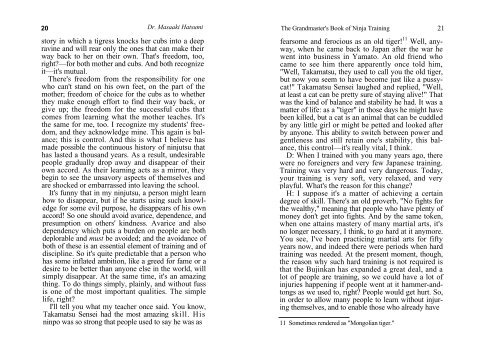Create successful ePaper yourself
Turn your PDF publications into a flip-book with our unique Google optimized e-Paper software.
22 Dr. Masaaki Hatsumi <strong>The</strong> <strong>Grandmaster's</strong> Book <strong>of</strong> <strong>Ninja</strong> Training 23<br />
some understanding <strong>of</strong> what I'm teaching to make<br />
plenty <strong>of</strong> progress without being held back by injuries—that's<br />
why the <strong>training</strong> has changed like this.<br />
Gradually, I. think I myself have come to a certain<br />
level <strong>of</strong> maturity, too.<br />
D: In the Western world, people tend to look at a<br />
person's physique—his muscles, his size—as a criterion<br />
<strong>of</strong> his power and ability. But in ninjutsu, I've<br />
seen that exactly the opposite <strong>of</strong> this criterion seems<br />
to apply; the less strong a person looks, the better he<br />
is. Can you explain this?<br />
H: Well, you remember I told you Takamatsu Sensei's<br />
remark about being a tiger and getting killed,<br />
becoming a cat and living? This is just the same. At<br />
the same time—well, you know, this man does karate,<br />
this fellow does judo, this guy's a wrestler, and if you<br />
look carefully you can tell—anyone can—what fighting<br />
style each will use. And then—it's all over!—at<br />
least if you're a true martial artist. For a true martial<br />
artist, to see an opponent's strength is to know what<br />
kind <strong>of</strong> attacks he is likely to use; such a person would<br />
never reveal himself in this way to an opponent, and<br />
if he's really skillful he will win lightly, without<br />
much effort, in a real fight. For example, if the opponent<br />
attacks from the front—well, in a sport the two<br />
have to compete face-to-face—but when a conflict is<br />
in earnest, there's no reason why one should not attack<br />
from behind, and such attacks are common.<br />
From a sporting point <strong>of</strong> view, though, this would be<br />
judged a cowardly foul. That's the long and the short<br />
<strong>of</strong> it, simply speaking. So, where the enmity is real, a<br />
person may be attacked on the toilet, or during lovemaking,<br />
or at mealtime. It's when people are feeling<br />
secure and at ease in wartime that they are most<br />
<strong>of</strong>ten wiped out. But when a man goes to the toilet, he<br />
takes his pistol in his hand, so he should be OK,<br />
right?! (Laughter)<br />
In sports, people <strong>of</strong>ten speak <strong>of</strong> favorite techniques,<br />
don't they? In judo, for example, they talk about how<br />
great somebody's favorite technique is, or they ask,<br />
"Hey, what's your favorite technique?" "Oh, mine's<br />
osotogari," and so on. But this kind <strong>of</strong> thing can be<br />
very dangerous in real life, as opposed to sport. You<br />
tell someone your favorite move and, being forewarned,<br />
he'll do his best not to be caught by it. Sometimes,<br />
people will ask a real martial artist, "Sensei,<br />
what's your favorite technique?" But when they come<br />
to me with that question, I reply, "So you want to try<br />
and kill me, huh?" One should never ask another<br />
person's favorite technique—it should be regarded as<br />
an absolute taboo—just as one should never show<br />
one's own. Nothing at all should be shown. In fact, it is<br />
better to seem to have no experience at all in martial<br />
arts. Hmm. OK?<br />
D: Yes, thank you. When you speak to us you usually<br />
emphasize the spiritual and artistic parts <strong>of</strong> the<br />
human being. Why are these so important for a person<br />
who practices martial arts?<br />
H: Well, for one thing, it's a matter <strong>of</strong> balance. If<br />
you know only one aspect, you lose the ability to see<br />
and know yourself; if a person practices only the<br />
techniques <strong>of</strong> his (or her) martial art, as he improves<br />
and becomes more skillful, he builds up an inflated<br />
illusion <strong>of</strong> his own ability and <strong>of</strong> himself. People lose<br />
sight <strong>of</strong> their own, and their martial art's, shortcomings.<br />
This is a terrible state to be in. It's really important<br />
to be always aware <strong>of</strong> and in touch with one's<br />
own faults. This is why I am practicing other arts and<br />
doing other activities. <strong>The</strong> link between them all is in<br />
the feeling, the inner attitude.<br />
<strong>The</strong> composer Mendelssohn once said, "Where conversation<br />
ends, music begins." 12 Again, the common<br />
thread is in the feeling. So, after taijutsu, what comes<br />
12 Translated from a Japanese version. I have been unable to<br />
find the original quotation (presumably in German).

















